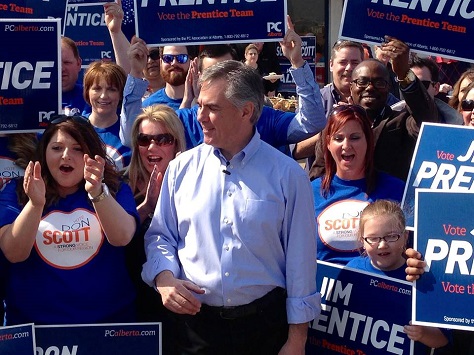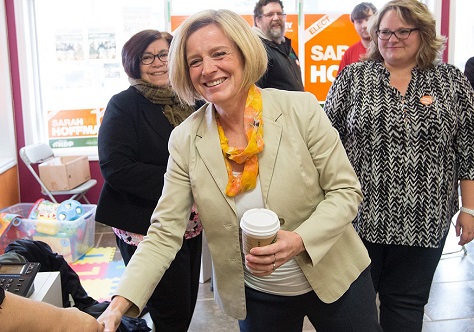When former federal minister Jim Prentice (pictured above), once among the closest allies of prime minister Stephen Harper, took on the office of Alberta’s premier last September, there was a sense that the province’s long-ruling Progressive Conservative Party was back on track.![]()
![]()
In the nine years since the indefatigable Ralph Klein left office, the PC held onto power under a series of increasingly ineffective leaders. The well-meaning Ed Stelmach, one of Canada’s leading officials of Ukrainian descent, lasted five years, and responded to the province’s first budget deficit in a generation by trying to tax the corporate oil interests that command so much power in both Alberta’s public and private sectors. Alison Redford, who won a poll-defying landslide in the 2012 provincial elections against the populist, right-wing Wildrose, so alienated voters with extravagant expenses, including a $45,000 bill for her trip to attend former South African president Nelson Mandela’s funeral, that she was forced out by her own caucus in March 2014.
So Prentice’s return to provincial politics, after a successful stint in the Harper administration and a detour to the private sector, signaled that the responsible adults had returned. There’s nothing particularly flashy about Prentice, But he oozes the quiet competence of a business consultant, and he has the Tory instincts of a rare Western Canadian politician who was never part of the Reform/Alliance (like Harper), but instead the old Progressive Conservative Party that merged into the Alliance to form today’s Conservative Party.
Just a few months into the Prentice era, the sometimes controversial leader of Wildrose, Danielle Smith, resigned the leadership and caucused with the Progressive Conservatives, bringing half of Wildrose caucus with her.
Even as oil prices started a precipitous fall last autumn, Prentice appeared like a premier in command, even if the sudden change in global oil markets suddenly left Alberta with a gaping hole in its budget. Prentice, who spent his first months in office shaking up the Albertan bureaucracy, seemed as much up to the challenge as anyone, and he promised his government would take the hard choices to close the budget deficit in three years, taking care not to raise corporate taxes to chase away potential business at a time of uncertainty for an economy so dependent on natural resources.
It’s not ridiculous that Prentice would have called an early election in a province that the Progressive Conservatives have ruled exclusively since 1971 to win his own mandate as premier, and it would not have been ridiculous to think he would easily win. As recently as February, the Prentice-led PCs were nearly 20 points ahead of Wildrose, struggling in the wake of Smith’s catastrophic betrayal, and the New Democratic Party of Alberta was attracting no more than 15% of the vote.
That’s all changed, virtually overnight, as the May 5 election approaches, and Prentice’s PCs are in a tough three-way contest with the NDP and Wildrose. Despite a consensus view that Prentice is a far superior premier than his two predecessors, he might soon lose office — the first political victim of the 2014-15 oil price collapse.
Predictions of Wildrose’s impending demise were premature, and the party is now waging a fierce battle to Prentice’s right on both fiscal and social issues. One of the reasons that Smith threw in the towel was her caucus’s willingness to sabotage her moderating stance on LGBT rights. (Smith, for the record, failed to win renomination within her new party, which has effectively ended the career of someone who seemed, a year ago, the premier-in-waiting). The party’s new leader, Brian Jean, argues that Prentice won’t go far enough to shore up Alberta’s finances.
The real star of the campaign, however, has been the NDP’s leader, Rachel Notley (pictured above), who was widely seen as having easily won a debate late last week against Prentice and Jean. One Forum poll conducted immediately after the debate gave the NDP a lead of 38%, easily passing both Wildrose (25%) and the PCs (20%).
Notley countered Prentice with a mix of insouciance and grace, especially after Prentice patronizingly scolded her with the words, ‘I know that math is difficult.’ The remarks spawned outrage on social media as being misogynistic and smarmy.
But the dustup came as Prentice appeared to be confusing the NDP’s policy to raise corporate tax rates in Alberta from 10% to 12%. Prentice had referred to Notley’s plan as a 20% tax when it’s really is just a 20% increase from the current rate. Though the ‘math is difficult’ comments were more devastating to Prentice, it’s telling that Prentice seemed to be deliberately exaggerating the NDP’s tax increase proposal, which is far less severe than Prentice argues. Notley’s NDP has also proposed a tax credit for job creation.
Notley has also called for a new royalty review to determine whether Alberta is getting a fair share of royalties from its oil and gas resources. Stelmach’s government established a similar review in 2007, which determined that Alberta should increase royalty rates and collect rates already owed. His government implemented some of the review’s recommendations but, under intense criticism from the energy industry, Stelmach subsequently reversed them after the worst of the 2009-10 financial crisis abated.
Roughly speaking, no party knows exactly how, in a period of rapid oil and gas industry contraction, to remedy the provincial budget shortfall, keep business interests happy and maintain steady employment. As premier, either Notley or Prentice will disappoint at least some of the province’s four million Albertans, who have grown accustomed to incomes far higher than any other province. In 2013, the province averaged GDP per capita of around C$84,000, nearly $30,000 higher than the Canadian average.
At it stands, no one is expected to win a majority of the 87 seats in the Legislative Assembly, where the PCs held 70 seats at the time of its dissolution earlier this month. Complicating the arithmetic is the fact that the three parties each have different geographic bases. The PCs are strongest in Calgary, the NDP widely leads in capital city Edmonton, and Wildrose dominates the rest of Alberta, especially in rural areas. Of the three, the PC’s hold on Calgary seems weakest. So if the NDP can surge there among urban voters, or if the PC vote collapses and their supporters defect to Wildrose, either challenger could conceivably win a majority.
For now, though, a tight three-way race could make for some very interesting coalition talks on May 6 if no one wins the 44 seats required for a majority. Even if the NDP wins the most seats, Prentice might still retain the premiership in a coalition with Wildrose, a more natural conservative ally. If the NDP falls just short of a minority, however, Prentice might find it difficult to stand in the way of an obvious Notley mandate, giving the NDP a chance at a minority government, perhaps even with support from a handful of PCs.
Provincial politics are so much different from politics that it’s difficult to extrapolate results into lessons for the future of federal politics. Harper will attempt to win a third consecutive term in October in elections, and his Conservatives are running even with the Liberal Party, under the new leadership of Justin Trudeau. If Prentice loses, it will be an embarrassment for Harper to watch one of his closest aides lose an election in Alberta. But the province’s Liberal Party has virtually collapsed in the wake of the NDP’s surge, falling far behind the other major parties, so there’s little comfort for the federal Liberals to take from the Albertan election no matter what happens.

